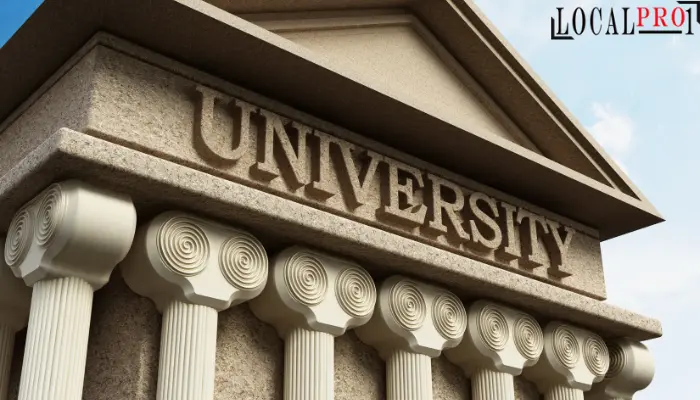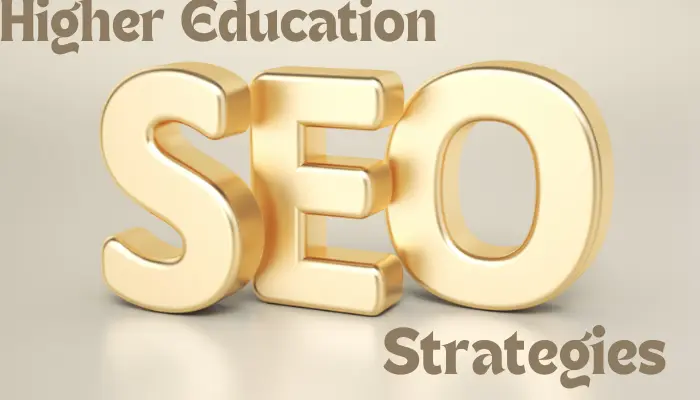SEO for universities plays a pivotal role in enhancing universities’ online visibility and digital presence. In the realm of higher education, where competition for student enrollment and academic reputation is fierce, implementing effective SEO strategies is imperative. This introduction will explore the definition of SEO for universities and underscore its significance in the higher education landscape.

Definition of SEO for Universities
SEO, or Search Engine Optimization, for universities, refers to the strategic process of optimizing the online presence and content of academic institutions to improve their visibility and ranking on search engine results pages (SERPs). This involves implementing various techniques and best practices to enhance a university’s website, making it more accessible, relevant, and attractive to search engines like Google, Bing, and Yahoo. The primary goal is to increase organic traffic, boost online visibility, and attract prospective students, faculty, and stakeholders by ensuring that the university’s web pages rank higher in search engine results for relevant queries.
Importance of SEO for Universities:
Enhanced Visibility and Reach: Effective SEO strategies increase a university’s visibility on search engines, making it more likely that prospective students and stakeholders will discover the institution when searching for relevant information.
Increased Web Traffic: By optimizing for relevant keywords and providing valuable content, universities can attract more organic traffic to their websites. This can lead to higher engagement and a broader reach among the target audience.
Competitive Advantage: SEO allows universities to stand out among their competitors by ensuring that their online presence is well-optimized. A higher ranking in search results can make a significant difference in attracting top talent, students, and funding opportunities.
Targeted Marketing: SEO enables universities to target specific demographics, geographic locations, and academic interests. This targeted approach ensures that the institution reaches the right audience with its messaging, increasing the likelihood of attracting qualified applicants.
Improved User Experience: SEO involves optimizing website structure, navigation, and content, leading to an overall improvement in the user experience. A user-friendly website is more likely to retain visitors, encouraging them to explore the institution further.
Building Credibility and Trust: Higher search engine rankings often correlate with credibility and trust. A university that appears prominently in search results is perceived as more authoritative and trustworthy, which can positively influence the perception of the institution.
Effective Communication: SEO encourages universities to create high-quality, informative, and engaging content. This not only satisfies the needs of search engines but also helps in effectively communicating the institution’s values, achievements, and offerings to the audience.
Understanding SEO for Universities
Keyword Research: Identify relevant keywords related to the university’s programs, courses, and areas of expertise.
Use tools to analyze search volumes, competition, and trends to choose the most strategic keywords.
On-Page Optimization:
On-page optimization refers to the practices and strategies implemented directly on a webpage to enhance its visibility and relevance to search engines. The primary goal is to make the page more attractive to both search engines and users. Key elements of on-page optimization include:
Keyword Optimization: Research and incorporate relevant keywords into the content, meta tags, and headers. Maintain a natural and user-friendly keyword density.
Content Quality: Create high-quality, informative, and engaging content.Ensure content is well-structured with proper headings, paragraphs, and formatting.
Meta Tags: Craft compelling and relevant meta titles and descriptions.Use unique meta tags for each page.
URL Structure: Create SEO-friendly URLs that are concise and descriptive.Include target keywords in the URL when possible.
Image Optimization: Optimize images for faster loading times. Make use of alt attributes and informative file names.
Internal Linking: Useful internal links should be included to enhance navigation. Create a logical and hierarchical site structure.
Mobile Optimization: optimization refers to actions taken off the website to enhance its authority and reputation online. Optimize for various screen sizes and devices.
Off-Page Optimization:
Activities carried out outside of the website to enhance its authority and reputation online are referred to as off-page SEO. The focus is on building external signals that indicate the site’s credibility and relevance. Key elements of off-page optimization include:
Link Building: Acquire high-quality backlinks from reputable websites. Diversify anchor text and focus on natural link building.
Social Media Presence: Establish and maintain a strong presence on relevant social media platforms. Share and promote content to increase visibility and engagement.
Brand Mentions: Encourage and monitor online mentions of the brand. Engage with users and address both positive and negative mentions.
Influencer Marketing: Collaborate with influencers in the industry to expand reach. Leverage influencers’ audiences to promote products or services.
Content Marketing: Create and share valuable content Marketing to attract links naturally. Guest posting and contributing to reputable publications.
Quality Content: Develop high-quality, informative, and engaging content that addresses the needs and queries of the target audience. Regularly update content to reflect changes in programs, faculty, and other relevant information.
Link Building: Build a network of high-quality, authoritative backlinks from reputable sources within the education sector.Internal linking aids in the hierarchy and structure of the website’s understanding by search engines.
Technical SEO: Optimize website speed, fix broken links, and improve overall website performance. Ensure proper indexing of web pages and utilize sitemaps to help search engines crawl the site efficiently.
User Experience (UX): Prioritize a positive user experience by having an intuitive navigation structure and easy-to-use interfaces. Optimize for mobile devices as many users access websites through smartphones and tablets.
Unique Challenges in SEO for Educational Institutions:
High Competition: Educational institutions face intense competition for keywords related to courses, programs, and degrees. It’s crucial to identify niche keywords and focus on specific aspects that differentiate the university.
Constantly Changing Information: Universities often update courses, faculty, and admission details, making it challenging to maintain accurate and up-to-date content. Regular content audits and updates are essential to ensure information accuracy.
Local and Global Targeting: Universities often target both local and international students, requiring a tailored approach to SEO strategies. Geographically targeted keywords and content can help address this challenge.
Multiple Stakeholders: SEO efforts need to consider various stakeholders, including prospective students, current students, alumni, faculty, and potential collaborators. Tailoring content to address the diverse needs and interests of these groups is crucial.
Balancing Marketing and Informational Content: Universities must strike a balance between marketing their programs and providing valuable, informational content. The content should not only be used to advertise the institution but also to provide a useful resource for students and researchers.
Navigating Compliance and Privacy: Educational institutions need to adhere to privacy regulations and ensure compliance with data protection laws. Implementing SEO strategies while respecting privacy concerns is essential.
Higher Education SEO Strategies

Identify Core Keywords:
- Focus on general terms like “university,” “higher education,” and specific program-related keywords.
- Use tools like Google Keyword Planner, SEMrush, or Ahrefs to find relevant keywords with high search volume.
Long-Tail Keywords:
- Include long-tail keywords specific to courses, departments, and unique offerings.
- Example: “online computer science degree” or “MBA with specialization in marketing.”
Local SEO:
- Incorporate location-specific keywords for attracting local and international students.
- Include city or region names, terms like “study in [city],” or “best universities in [region].”
Content Optimization for Academic Institutions:
Quality Content:
- Create high-quality, relevant, and engaging content that answers prospective students’ questions.
- Regularly update content to reflect changes in programs, faculty, and facilities.
On-Page SEO:
- Optimize meta titles, descriptions, and headers with targeted keywords.
- Use descriptive alt tags for images and ensure proper URL structure.
Mobile Optimization:
- Ensure that the website is mobile-friendly, as many users search for educational information on mobile devices.
Landing Pages for Courses and Programs:
Unique Landing Pages:
- Create dedicated landing pages for each major program and course.
- Include program details, admission requirements, career prospects, and testimonials.
Clear CTAs:
- Implement clear and compelling Calls-to-Action (CTAs) for inquiries, applications, or virtual campus tours.
Interactive Content:
- Embed videos, virtual tours, or webinars to enhance engagement and provide an immersive experience.
Link-Building Strategies for University Websites:
Educational Directories:
- Submit university information to relevant educational directories.
- Engage in partnerships with educational organizations for mutual backlinking.
Guest Posts and Outreach:
- Contribute articles to authoritative education websites or blogs.
- Reach out to industry influencers, alumni, or faculty for collaboration and link-building opportunities.
Internal Linking:
- Strategically link between relevant pages within the university website.
- Enhance user navigation and distribute link equity effectively.
Alumni Engagement:
Alumni Testimonials:
- Showcase success stories and testimonials from alumni on various pages.
- Encourage alumni to share their experiences through blog posts or videos.
Social Media Integration:
- Leverage social media platforms to connect with alumni.
- Share updates, events, and success stories, encouraging sharing and engagement.
Alumni Networks:
- Foster alumni networks through dedicated sections on the website.
- Promote events, reunions, and networking opportunities.
Importance of SEO for Higher Education

Increasing Visibility in Search Engines:
Online Presence: Prospective students heavily rely on search engines to gather information about universities and courses. Implementing effective SEO strategies ensures that the institution’s website ranks higher in search engine results, increasing visibility among the target audience. Local Pro1 provides the best service related to SEO for Universities.
Competitive Edge: Higher visibility in search engines helps institutions stand out in a competitive landscape. With numerous universities vying for the attention of potential students, a strong online presence can set an institution apart and attract more interest.
Attracting Prospective Students through SEO:
Targeted Marketing: SEO allows universities to optimize their content for specific keywords related to courses, programs, and campus life. This targeted approach ensures that the institution reaches students actively searching for relevant information, increasing the likelihood of attracting qualified applicants.
Enhanced User Experience: SEO involves optimizing website structure and content, leading to a better overall user experience. A user-friendly website is more likely to engage prospective students, encouraging them to explore further and consider the institution as a viable option.
Impact on Enrollment and Institutional Reputation:
Trust and Credibility: Websites appearing at the top of search results are often perceived as more trustworthy and credible. Implementing SEO best practices enhances an institution’s online credibility, positively influencing the perception of prospective students, parents, and other stakeholders.
Increased Enrollment: Improved visibility and a positive online reputation resulting from effective SEO can lead to increased enrollment numbers. When an institution is easily accessible and positively perceived online, it can attract a larger pool of applicants, ultimately contributing to higher enrollment figures.
Conclusion
Navigating the ever-changing digital landscape, universities must integrate SEO into their strategic plans to remain successful and visible in the highly competitive world of higher education. SEO is no longer an option, but a necessity for sustained growth. Feel free to contact us for any type of query or service related to the SEO for Universities.
FAQs
What Is SEO, And Why Is It Important For Universities?
Search Engine Optimization (SEO) is the practice of optimizing a website to improve its visibility on search engines. For universities, SEO is crucial as it helps in attracting prospective students, enhancing online presence, and staying competitive in the digital landscape.
How Can Universities Benefit From Implementing SEO Strategies?
Implementing SEO strategies can benefit universities by increasing website traffic, improving rankings on search engine result pages, reaching a wider audience, and ultimately boosting enrollment and engagement.
What Are Some Key SEO Techniques For Universities?
Effective SEO techniques for universities include optimizing website content, utilizing relevant keywords, creating a user-friendly website structure, implementing local SEO strategies, and leveraging social media for increased visibility.
How Does Content Optimization Contribute To SEO for Universities?
Content optimization involves creating high-quality, relevant, and valuable content that aligns with the university’s goals and target audience. This not only improves search engine rankings but also enhances the overall user experience on the website.
Can Local SEO Benefit Universities?
Yes, local SEO is essential for universities, especially for attracting local students. Optimizing for local search helps in targeting a specific geographic area, ensuring that the university appears in local search results and maps when potential students are looking for educational institutions in their vicinity.
